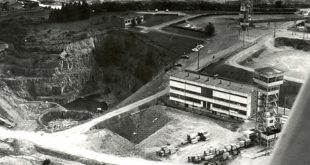The “Silense” European project launched in May 2017 is aimed at redefining the way we interact with machines. By using ultrasound technology similar to sonar, the researchers and industrialists participating in this collaboration have chosen to focus on 3D motion sensing technology. This technology could allow us to control our smartphone or house with simple gestures, without any physical contact …
Read More »Search Results for: environment
Thierry Djenizian
Mines Saint-Étienne | #EnergyTransition #RenewableEnergies #Environment
Read More »Trust, a tool for reducing technological risks?
This article is part of our series on trust, published on the occasion of the release of the Fondation Mines-Télécom brochure: “The new balances of trust: between algorithms and social contract.” A sociologist with IMT Atlantique, Sophie Bretesché is specialized in the risks associated with technology. She has worked extensively on the issue of redeveloping former uranium mines in mainland France. …
Read More »Fine particulate pollution: can we trust microsensor readings?
Nathalie Redon, IMT Lille Douai – Institut Mines-Télécom Last May, Paris City Hall launched “Pollutrack”: a fleet of micro sensors placed on the roofs of vehicles traveling throughout the capital to measure the amount of fine particles present in the air in real-time. A year before, Rennes proposed that residents participate in assessing the air quality via individual sensors. In France, for several …
Read More »Air quality: several approaches to modeling the invisible
The theme day on air quality modeling (organized by FIMEA and IMT Lille Douai) on June 8 provided an opportunity for researchers in this field to exchange on existing methods. Modeling makes it possible to identify the link between pollution sources and receptors. These models help provide an understanding of atmospheric processes and air pollution prevention. What will the pollution …
Read More »Improving heating network performance through modeling
At the IMT “Energy in the Digital Revolution” conference held on April 28, Bruno Lacarrière, an energetics researcher with IMT Atlantique, presented modeling approaches for improving the management of heating networks. Combined with digital technology, these approaches support heating distribution networks in the transition towards smart management solutions. The building sector accounts for 40% of European energy consumption. As a …
Read More »How biomechanics can impact medicine – Interview with Jay Humphrey
It is a love for mechanics and mathematics, as well as an intense interest in biology and health, that led Jay Humphrey towards the field of biomechanics. Right after his PhD from the Georgia Institute of Technology in Engineering Science and Mechanics, in 1985, he pursued post-doctoral training in cardiovascular research at The Johns Hopkins University School of Medicine. Now …
Read More »Digital technology and energy: inseparable transitions
What if one transition was inextricably linked with another? Faced with environmental challenges, population growth and the emergence of new uses, a transformation is underway in the energy sector. Renewable resources are playing a larger role in the production of the energy mix, advances in housing have helped reduce heat loss and modes of transportation are changing their models to …
Read More »Fabrice Flipo
Institut Mines-Télécom Business School | #Sociology #Environment #GreenIT #PoliticalEcology
Read More »Viruses and malware: are we protecting ourselves adequately?
Cybersecurity incidents are increasingly gaining public attention. They are frequently mentioned in the media and discussed by specialists, such as Guillame Poupard, Director General of the French Information Security Agency. This attests to the fact that these digital incidents have an increasingly significant impact on our daily lives. Questions therefore arise about how we are protecting our digital activities, and …
Read More » I'MTech L'actualité scientifique et technologique de l'IMT
I'MTech L'actualité scientifique et technologique de l'IMT









